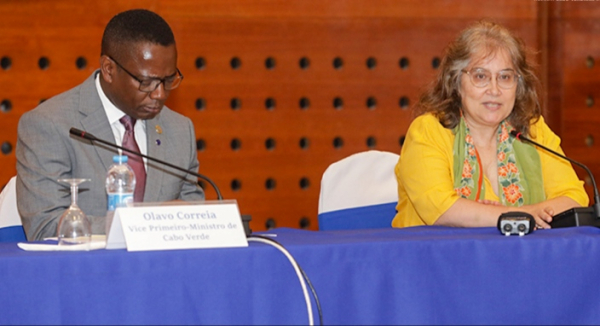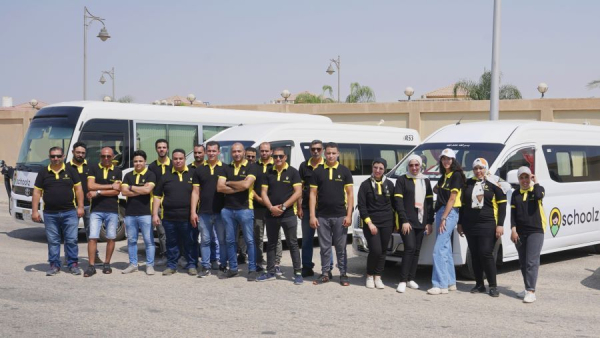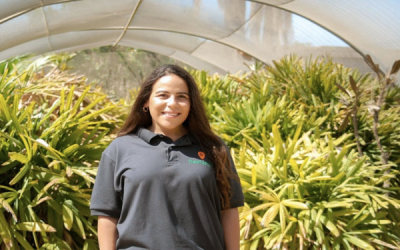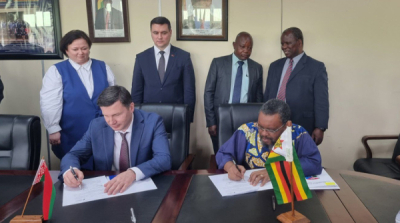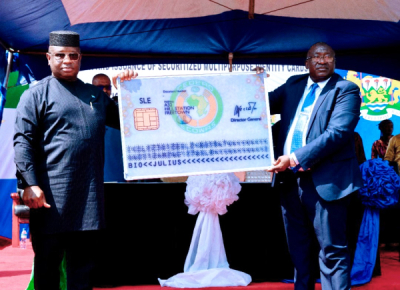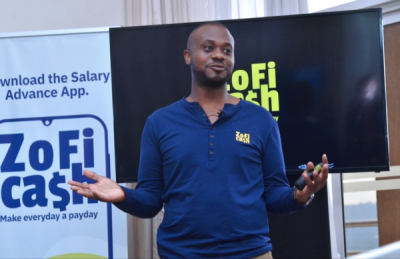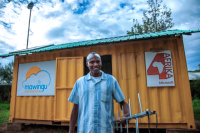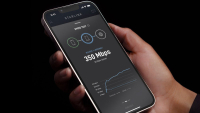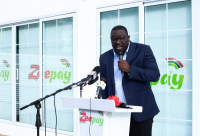With its digital footprint growing over the years, Africa has to deal with cyber threats that could jeopardize the development of its digital economy. This is the reason why most countries on the continent are betting on increased collaboration, with both regional and international partners, to clean their cyberspaces.
Last Monday, at the opening of the TAIEX INTPA International Strategic Seminar on Cybersecurity organized by the European Union and Cabo Verde, Cabo Verdean deputy Pirmer Minister Olavo Correia (photo, left) announced his country's plan to establish a national cybersecurity center.
He also appealed to the European Union for assistance with the implementation of that tedious project. "We want, along with the European Union, to work so that we have an effective National Cybersecurity Centre, so that we have a more robust regulatory framework so that we can be aligned with the best practices in terms of security," he said.
According to the government official, the planned center will allow Cabo Verde to deal with cyber-attacks and invest in the development of cybersecurity talents, which will also benefit other countries, notably West African neighbors.
The European Union replied it was ready to assist the country in the project given their common interests in data protection. "This is an area to which Cabo Verde attaches great importance and it is also an area to which we, the European Union, attach importance, not least because of the passage through the country of the EllaLink undersea cable, through which European data circulates, and it is also of interest to us to ensure the security of that data," said Carla Grijó (photo, ambassador), EU ambassador to Cabo Verde.
Samira Njoya
In large African towns, it is sometimes difficult to move around, with the constant traffic jams and poor roads. In that context, Schoolz wants to help students easily get to school.
Schoolz is a digital solution developed by an Egyptian startup to help students get to school easily no matter the conditions of the roads and the state of the traffic.
Using its Android or iOS apps, users can register for its services (only parents are allowed to register on behalf of underage students), access a list of bus routes and the real-time location of the bus they are going to board
The startup behind the solution explains that to ensure safety, it uses modern technologies and cameras and employs trained drivers and supervisors inside each bus. Currently, on Playstore, its Android app has been downloaded more than 5,000 times already.
"In the first week of the launch, we transported the first group of students to their schools, then we transported children to the club during the weekend. Quickly, schools, sports academies, and clubs communicated to us to use our services. We immediately provided technology, tools, and transportation technology for them, whether using our fleet or by using Schoolz system to manage the transportation process smoothly and completely," explains Hosni Ahmed, CEO and co-founder of Schoolz.
The startup now wants to diversify its operations and enter the business field, offering SaaS solutions to companies in Saudi Arabia and Egypt.
Adoni Conrad Quenum
She is a passionate entrepreneur who wants to give back control over the entire food value chain to significantly reduce crop losses in Egypt. With her brother, she developed a tech solution for that purpose.
Farah Emara (photo) is the CEO of Egyptian agritech startup Freshsource, which she launched with her brother Omar Emara.
Her startup leverages data and tech tools to transform the lives of producers, businesses, and consumers by creating sustainable food systems. It was launched after its two co-founders realized that in Egypt, food security is jeopardized because close to 30% of crops are lost due to poor post-harvest, storage, and transportation conditions. They also noticed that the high number of intermediaries in the supply chain and the lack of transparency generate an about 80% income shortfall for farmers.
Therefore, with over 80 employees, the startup launched in Cairo, in 2018, manages the entire fresh food value chain, including transportation, storage, and packaging in cold storage and appropriate facilities. It buys from farmers at consistent prices and sells the products at reduced rates. Nowadays, it serves clients in 11 cities in Egypt, with the aim of becoming the leading agricultural supply chain platform in the Middle East and North Africa region and changing the way fresh produce is bought, transported, and sold. It has already transported more than 10,000 tons of produce and claims over 1,000 deliveries weekly.
"FreshSource is disrupting the Egyptian agriculture industry by streamlining the value chain through technology. We are the region’s first B2B platform for fresh fruits and vegetables, connecting producers to businesses by leveraging data and technology and providing last-mile solutions," Farah Emara said in 2022.
Before founding FreshSource, between 2012 and 2016, she worked for Endeavour, a global community of high-impact entrepreneurs, as an entrepreneur selection and growth analyst and then as an entrepreneur selection and growth manager. In March 2016, she joined the consumer goods company Procter & Gamble where she worked as a Strategic Business Manager for the Middle East until 2018.
Let's note that her startup is among the 14 businesses selected for the 2023 Africa Tech Summit (February 15-16). In 2022, she received the Digital Agriculture Award of the year, issued by the World Bank and the IFC.
Melchior Koba
In 2022, telecom networks were seriously disrupted in Cameroon. In that context, with the investments, Orange wants to develop its services to fully satisfy its subscribers.
Orange, one of the leading telecom companies in Cameroon, will invest XAF150 billion (US$252 million) over the next five years to secure, expand and modernize its network infrastructure. The investment plan was announced by the operator's executives during a meeting with the local telecom regulator ART's officials last Tuesday.
According to Patrick Benon, CEO of Orange Cameroon, the investment will ensure improved service quality and network coverage in some areas not yet covered by Orange Cameroon. It will also allow the development of more innovative solutions, he added.
Of the XAF150 billion investment announced, XAF30 billion will fund the digitalization of service processes, and service platforms notably. The aim is to make the platforms more flexible and easy to use so that their integrated offers, services, and applications can be easily used but also streamline the after-sales service pathway to provide an improved customer experience.
Patrick Benon explains that during the meeting with the ART, Orange made firm commitments to improve its service quality this year.
It should be noted that this meeting is part of the consultation initiated by the ART to address the challenges that prevent the development of the telecom sector in general, and the digital economy in particular, in Cameroon. It follows a seminar organized (with support from the Ministry of Posts and Telecommunications) in Yaounde, in December 2022, to discuss the quality of telecom services.
Samira Njoya
By introducing multipurpose cards, the government plans to address the ongoing challenges faced by citizens who have no identity documents and improve access to essential services.
Last Monday, Sierra Leonan President, Dr. Julius Maada Bio (photo, left), officially launched the production and verification of secure, multi-purpose biometric identity cards in Sierra Leone.
The new multi-purpose smart cards are the result of a public-private partnership between the Government of Sierra Leone and Constrat Systems (SL) Ltd. They are designed to facilitate the identification of every citizen, reduce the cost of financial transactions, and increase financial inclusion, among other things.
"With the chip-based biometric ID, banks, forex bureaus, micro-finance institutions, mobile money providers, and other financial service providers, among others, can now easily and effectively carry out the electronic know-your-customer (eKYC) process to authenticate and verify their customers at far lower costs for trusted financial transactions across Sierra Leone," the President said.
The new biometric card can be issued to Sierra Leonans (National ID cards), ECOWAS nationals (ECOWAS ID cards), and other foreigners (non-national ID cards). It will offer holders the possibility of carrying out transactions anywhere and at any time while enjoying the dual advantage of verifying their identity and being able to easily access the various social facilities provided by the government.
Let's note that in January, the Sierra Leone Civil Registration Authority (NCRA) and the Modular Open Source Identity Platform (MOSIP) signed a memorandum of understanding for the implementation of a national digital identification system.
Samira Njoya
The tech enthusiast is a computer system and network administrator who graduated from ABCO Technology, an accredited Californian computer training academy. After years of experience in the U.S Tech environment, he decided to launch Zofi Cash, which provides instant salary advances to help Ugandans handle emergency needs.
Paul Kirungi (photo) is a Ugandan tech entrepreneur and the founder/CEO of Zofi Cash, a fintech startup that provides instant salary advances to employees.
The entrepreneur, based in the U.S. since 2012, founded Zofi Cash in 2020 to break the 30-day pay cycle in Africa. His solution allows employees to address their financial emergencies before payday with very low-interest rates without any collateral other than employers' approval.
"Zofi Cash is a financial services company focused on breaking the 30-day pay cycle. We seek to change the way employees or contractors get paid in this country and across Africa. That is why our salary advance service is now a market leader, and we haven’t stopped innovating. Our teams are intentional about the continuous improvement of the platform to allow more people to get paid daily," he said in an interview with entrepreneur ecosystem builder Innovation Village Uganda.
On January 31, 2023, Zofi Cash was selected, along with 13 others, to participate in the 2023 Africa Tech Summit (Feb 15-16) at the Sarit Expo Centre in Nairobi, Kenya.
Paul is an alumnus and ambassador of the Startup Africa Roadtrip, a non-profit organization supporting innovation in developing countries.
He entered the professional world in 2016, working as a systems support at Providence Hospital, in California. Months later, he joined Barkley Court Reporters as a system administrator. Thanks to Zofi Cash, he received the Next Generation Africa 2021 Best Fintech issued by Startup Africa Roadtrip.
Melchior Koba
Jand2Gidi is a digital startup developed by a Nigerian logistics startup. It allows merchants to send packages around and outside Nigeria and also receive packages from abroad.
To access its services, users need to visit its web platform and create an account to access the Jan2Gidi dashboard that allows subscriptions to the various services.
The solution allows users to have international delivery addresses where their packages can be delivered. From there, it takes over to deliver the packages in Nigeria. It also offers a service called "Shop For Me," which enables users who so wish to order from US and UK stores through Jan2Gidi.
It also offers bicycle or van delivery services from Lagos and Abuja to the 36 states in Nigeria, transportation and relocation services as well as sea freight for heavy machinery, cars, and bulky items to be shipped to Nigeria.
In January 2023, the startup was selected, along with ten others, to participate in the third edition of the Africa Startup Initiative Program (ASIP) acceleration program that entitles participants to US$18,000 in equity contribution and US$750,000 in credits, services, and in-kind value.
Adoni Conrad Quenum
The internet service provider currently operates in 15 counties but, it plans to add 10 more counties to its network, therefore providing services to over 250,000 Kenyans over the next five years.
recently announced the closing of its US$9 million Series B funding round. It raised US$6 million fromInfraCo Africa's investment arm and US$1.5 million from E3 Capital and the same amount from the Dutch Entrepreneurial Development Bank FMO.
"Mawingu’s aim is not to simply drop an Internet cable at someone’s house. We seek to help our customers access new opportunities for work, education, entertainment, and social connections through the power of the internet," said Mawigu's CEO, Farouk Ramji.
Since 2012, Mawingu has been providing internet services in Kenyan rural and peri-urban areas. In late 2022, it was claiming over 7,500 active users and more than 300,000 hotspot users across the country.
Its ambition is to give internet access to 100 million Africans. For Claire Jarratt, InfraCo Africa Chief Investment Officer, Mawingu contributes to economic development by providing internet access to populations. "As our first telecoms investment, Mawingu appealed to us as its services are designed to provide affordable internet access tailored to the needs of underserved rural customers," she said.
Samira Njoya
Starlink, the satellite constellation operated by Elon Musk's SpaceX, launched its satellite internet services in Nigeria yesterday, January 31. Its aim is to provide a fast and reliable internet connection to users.
On Twitter, the company announced that Nigeria is the first African country to be able to use SpaceX's network. It also indicated that the service will launch, this year, in several other African countries, including Mozambique, Kenya, and Angola. South Africa was also supposed to welcome the satellite internet services this year but, in August 2022, SpaceX dashed the hopes by updating its rollout plan.
The approval comes six months after the Ghanaian fintech startup raised US$10 million from Symbiotics BV and a Mauritian fund.
Ghanaian fintech startup Zeepay recently received the Central Bank of Zambia's approval to operate in Zambia offering users the possibility to directly send funds from their mobile money wallets to over 150 countries.
According to Andrew Takyi-Appiah (photo), co-founder and managing director of Zeepay, the new service, which is the first of its kind in the world, is the result of a partnership with Moneygram International. "Our partnership with MoneyGram is helping to make Africa borderless day by day, and we are excited to be at the forefront of this revolutionary change," he said.
Zeepay operates in more than 25 countries around the world. Since its launch in 2016, it has grown exponentially. In March 2020, it became the first Ghanaian company to secure an Electronic Money Issuer (EMI) license from Bank of Ghana, the Ghanaian central bank.
In August 2022, it raised US$10 million to enter more African markets and support local banks.
Samira Njoya
More...
The solution was launched to boost the visibility of Egyptian handmade items and attract national and international clients for its local users.
Muqbis is an e-commerce solution launched to allow local artisans to showcase their products to an international audience. It was created, in 2021, by the Egyptian startup Muqbis.
To access its services as buyers, users need to visit its web platform where they can browse the various products ranging from pottery, embroidery, and jewelry to artwork and brass work. Once they select the items they need, they can create an account to finalize the purchase or log in if they already have a Muqbis account. As for artisans, they can register for an account that allows them to showcase their products to potential buyers.
On its front page, the solution showcases best sellers, best-rated items, and those with ongoing promotions, boosting the visibility of those items and ultimately sales. Payments can be made either with a banking card or in cash at delivery. However, for the time being, no mobile money solution is available.
Muqbis has a return policy that gives buyers 30 days from the reception date to return any defective items. Its only condition is that the item should be unused and still in the same condition as received. Let's note that in December 2022, the startup behind the solution raised funds to support its expansion.
Adoni Conrad Quenum
The talented and passionate entrepreneur leverages his IT expertise to support local entrepreneurs and help them succeed.
Abdelsalam Safi (photo) is a Chadian social and tech entrepreneur. He is one of the co-founders and CEO of WenakLabs, the first startup incubator in Chad.
His incubator, founded in 2014, claims to be both a media lab and a tech hub that aims to help bridge the digital divide and promote tech entrepreneurship by all means. It also defines itself as a "space of collective intelligence and social innovation" that "defend a horizontal and transparent way of working."
Last January 18, it inaugurated its media lab, which is equipped with all the professional tools that can facilitate audiovisual and digital works and get training in related professions. Some of its equipment enables photo and video shooting, graphic designing, and the production of web TV shows.
" Our media lab is an interdisciplinary research lab where researchers, artists, designers, etc. can work together to leverage ICT potentials to solve problems and identify new opportunities", explained Abdelsalam Safi.
Since February 2020, the tech entrepreneur is the country director of the Chadian chapter of the American business incubator Founder Institute. Since 2006, he is also a member of the nonprofit organization Free Software Foundation.
His professional career began in 2012 when he started teaching system and network administration at the Chadian private school IPNT (Institut Polytechnique de nouvelles technologies). About a year later, he also started teaching Java object-oriented programming at the University Institute of Sciences and Technology of Abeche.
Melchior Koba
According to Mastercard's report "The Future of Fintech-Africa," the number of fintech startups operating in Africa rose 81% between 2019 and 2021. Some of those startups operate outside the law and are deemed predatory. Authorities are now taking measures to make them compliant.
In Nigeria, an additional 106 digital lenders got their approvals to operate from the Federal Competition and Consumer Protection Commission (FCCPC) last Wednesday, January 25. A few days later, on January 30, the Central Bank of Kenya (CBK) licensed 12 fintech startups, raising the number of licensed fintech startups in the country to 22.
"The focus of the engagements has been inter alia on business models, consumer protection, and fitness and propriety of proposed shareholders, directors, and management. This is to ensure adherence to the relevant laws and importantly that the interests of customers are safeguarded, " the CBK indicated in its release announcing the licensing.
In 2022, Kenya and Nigeria took regulatory measures to secure the digital lending landscape following consumers' growing complaints about the various practices, including high-interest rates and the name-and-shame behavior, in that ecosystem. Nigeria even took down more than 50 loan apps from Playstore, according to an interview with FCCPC CEO Babatunde Irukera.
Also, in November 2022, Google informed digital lenders operating in the two countries that starting from January 2023, it would host their app on Playstore only when they submit a genuine business license. "Google has been very supportive, including providing their expert knowledge and experience in offering advice on what works best in achieving laudable regulatory objectives," he said.
Since March 2022, the CBK has received 381 licensing applications. In Nigeria, of the 106 fintech startups that have received their approvals, 65 have received full approval, while the remaining 41 have received conditional approval.
Samira Njoya
The talented entrepreneur combined tech tools and his experience in the event industry to offer an innovative solution to help event specialists in their work.
Haythem Dridi (photo) is the founder of the tech company Millesima Technologies. The Tunisian-born entrepreneur is a Mathematics and Physics graduate from the Faculty of Science of the University of Sfax, Tunisia. He is also a certified project manager.
Millesima Technologies, the startup he manages as the CEO, is a Startupact-certified Tunisian company. It specializes in data and on-demand video streaming. The startup launched in 2021 also offers face-to-face, hybrid and virtual solutions to event specialists.
In late 2022, it raised US$480,000 from private equity firm BH Equity to launch MYVIOO, a digital platform that allows firms and organizations to launch free or paid on-demand video and live-streaming channels that can be used as advertising spaces.
Haythem Dridi's entrepreneurial adventure began with the creation of Millesima Travel and Millesima Events in 2004. Millesima Travel is a licensed Tunisian travel agency specializing in B2B hotel booking and business travel management.
Meanwhile, Millesima Events is an events agency based in Morocco and Tunisia. The agency has already worked with 794 clients and organized 2,596 national, 60 overseas, and 150 virtual and hybrid events.
It is somehow the originator of Millesima Technologies, which was launched to allow it to continue its operations when the coronavirus pandemic forced a cessation of face-to-face events.
Melchior Koba


